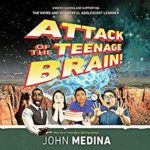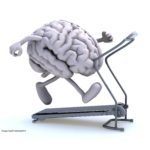Psychology can offer advice to teachers, but sometimes that advice is frustratingly vague.
We know, for example, that attention is important.
We know that it results from a combination of three neural processes: alertness, orienting, and executive attention.
But: what do teachers DO with that knowledge? How do we teach any differently?
Retrieval Practice Timing
 For example, we’ve seen lots of research showing that retrieval practice helps students learn.
For example, we’ve seen lots of research showing that retrieval practice helps students learn.
That is: rather than simply looking back over material, students should somehow quiz themselves on it.
They might use flash cards.
They might try a “brain dump”: just writing down everything they remember on a topic.
They can use quizlet to review key points.
Given that lots of student learning happens with textbooks, teachers have a very practical question: when should they do that retrieval?
Textbooks often include practice questions. Should students try to answer them as they go along? Or, should they wait until they have read the full chapter?
Happily, this question can be studied quite straightforwardly.
Uner & Roediger had three groups of students read a chapter from a science textbook.
One group did nothing to review.
A second group reread key passages from the book.
A third group answered the self-study questions in the textbook. Some of those questions appeared at the end of a section. Some appeared at the end of the chapter. And some appeared in both places.
Which group remembered this information better two days later?
Retrieval Practice Timing, and Beyond
Unsurprisingly, the students who reread the information remembered a bit more than those who did not. The rereaders averaged a 44.8 on the quiz, whereas the one-time readers averaged a 34.2.
The self-testers? They averaged a 61.5.
As we’ve seen before, self-testing is a HUGE help.
(By the way, you might think “61.5 is a terrible score. That’s almost failing!” However, this isn’t a class test; it’s a relative measurement. The point isn’t what the students scored, but how the groups scored compared to each other. The self-testers remembered much more.)
What about the timing? Is it better to answer questions at the end of the section, or the end of the chapter.
As it turned out, both times worked equally well. As long as students do the retrieval practice, it doesn’t particularly matter at what point in the chapter they do so.
Here’s the intriguing finding: questions answered twice — both at the end of the section and and the end of the chapter — led to even higher learning.
That might not sound surprising, but other researchers have found that one retrieval practice exercise produces as much benefit as two.
Keepin’ It Real
Psychology researchers could easily get focused on studies in the lab. They can control variables better; they’re faster to run.
I always feel especially happy to find researchers who keep their gaze on practical classroom applications.
In this case, we’ve learned: a) that retrieval practice helps students learn from textbooks, b) that students can answer relevant questions at any time and still get this benefit, and c) that two attempts to answer the question are (or, at least, might be) better than one.



